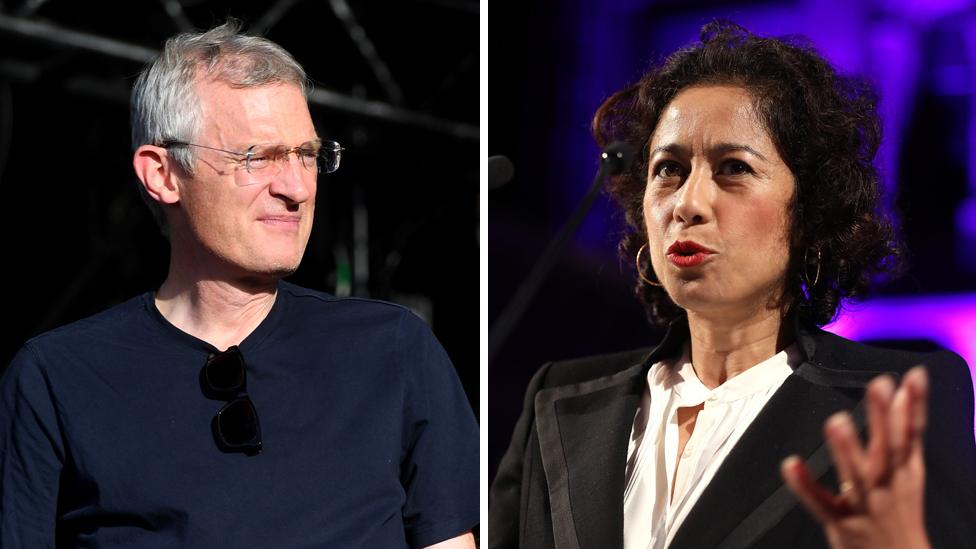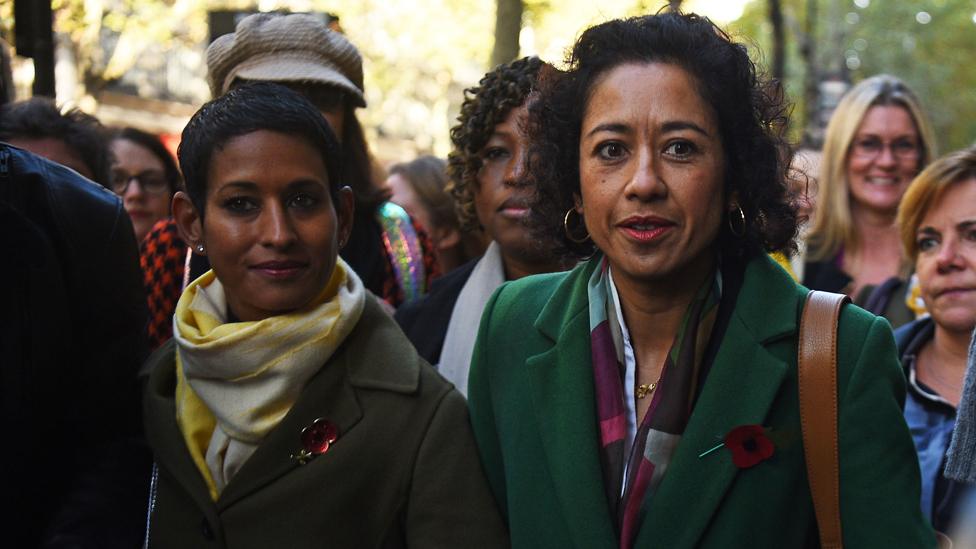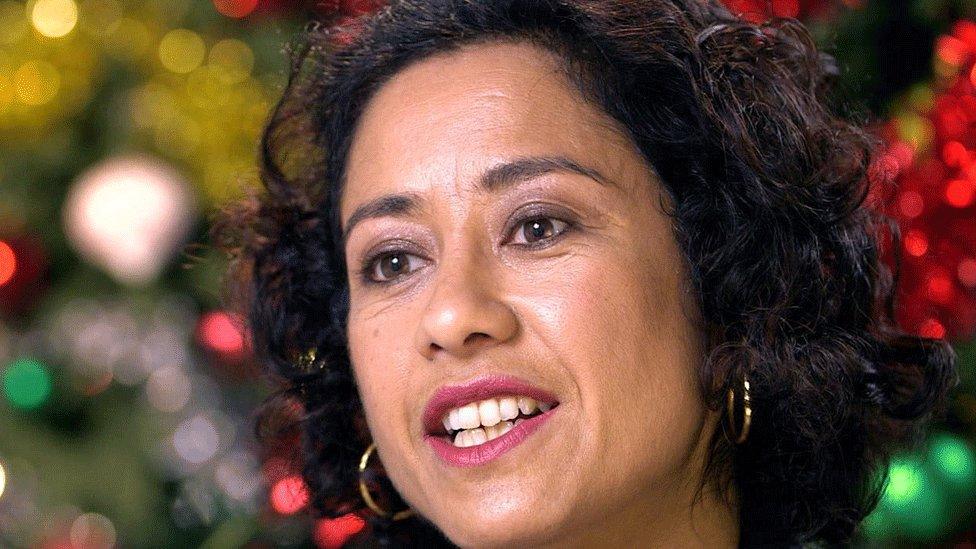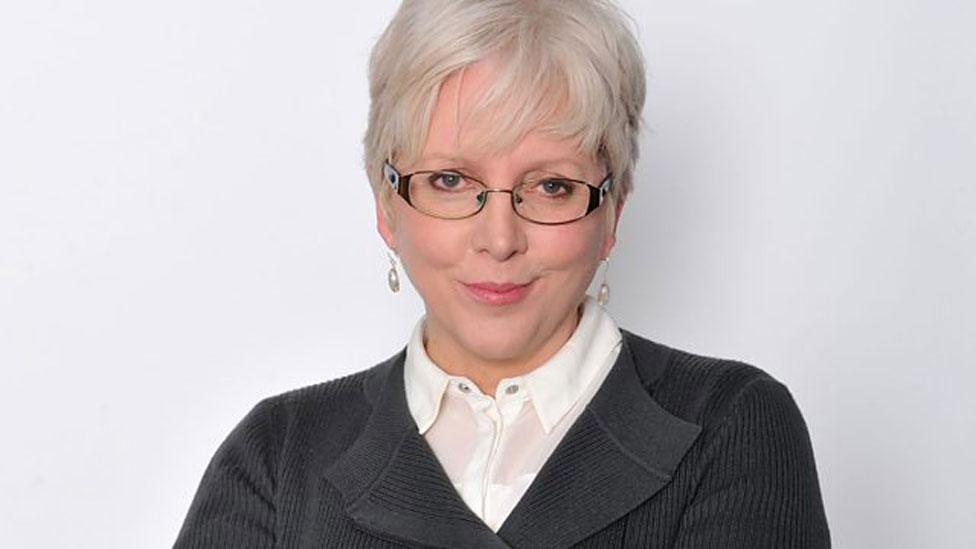Presenter Samira Ahmed takes BBC to tribunal
- Published

Jeremy Vine was paid considerably more than Samira Ahmed for what the union will argue was comparable work
Presenter Samira Ahmed has taken the BBC to tribunal this week, arguing she was paid "a sixth" of what Jeremy Vine earned in "a very similar job".
Ahmed says she was paid £440 per episode on audience feedback show Newswatch, while Vine received £3,000 per episode for Points of View.
The BBC's legal team argue the two presenters were not doing similar work.
Journalists' union the NUJ described the BBC's gender pay gap as "monumental".
Ahmed has presented Newswatch since 2012. According to the NUJ, although her wages were increased in 2015 to £465 per programme, they were reduced again when the corporation moved presenters onto employment contracts.
The NUJ said Vine's fee for Points Of View was reduced to £1,300 in January 2018. He left the programme in July of the same year.

Samira Ahmed (r) and fellow BBC presenter Naga Munchetty arrive at the employment tribunal at Victory House, London on Monday morning
BBC News presenter Carrie Gracie, who fought her own battle with the corporation over equal pay, said she knew of around 12 more people with employment tribunals "in the pipeline".
She said the BBC's management was "defensive and resistant to admitting mistakes", and that Ahmed's case was "emblematic and extremely important to all the other women still fighting".
Ahead of her tribunal, Ahmed said she loved her role on Newswatch, in which audiences critique the BBC's reporting of news and current affairs, "despite it being difficult and challenging".
"I know that it is an important part of demonstrating the BBC service to all its audiences and the licence fee payers.
"I have a sense of pride working for a public service broadcaster which seeks to represent the diversity of Britain and its licence fee payers."
Allow X content?
This article contains content provided by X. We ask for your permission before anything is loaded, as they may be using cookies and other technologies. You may want to read X’s cookie policy, external and privacy policy, external before accepting. To view this content choose ‘accept and continue’.

She added: "On the back of my BBC ID card are written the BBC values which include 'we respect each other and celebrate our diversity' and 'we take pride in delivering quality and value for money'.
"I just ask why the BBC thinks I am worth only a sixth of the value of the work of a man for doing a very similar job."
'Gender not a factor'
In response to her claims, the BBC insisted it "is committed to equal pay", explaining the pay difference occurred due to the fact Vine's show is "entertainment" and Ahmed's programme was "news".
"Points of View is an entertainment programme with a long history and is a household name with the public. Newswatch - while an important programme - isn't.
"Samira was paid the same as her male predecessor when she began presenting Newswatch. Gender has not been a factor in levels of pay for Points of View. News and entertainment are very different markets and pay across the media industry reflects this."
The NUJ said it was backing Ahmed's case because "the scourge of unequal pay has no place in our public service broadcaster".
"Unfortunately, despite Samira going through a lengthy and frustrating internal process in the hope that a sensible solution could be achieved, the BBC has not resolved this case and it will now be for the tribunal to determine whether this monumental pay gap is appropriate and defensible," said NUJ general secretary Michelle Stanistreet.
"Samira is to be congratulated for her persistence and determination to secure fair and equal treatment by her employer."
Other broadcasting colleagues including Naga Munchetty, Sandi Toksvig, Alan Rusbridger, Andrew Copson, Baroness Sayeeda Warsi and the Right Reverend Nicholas Baines have offered Ahmed their support.
The case opened on Monday at the Central London Employment Tribunal with witnesses expected to appear on Tuesday.
It is listed to last for seven days.

Follow us on Facebook, external, on Twitter @BBCNewsEnts, external, or on Instagram at bbcnewsents, external. If you have a story suggestion email entertainment.news@bbc.co.uk, external.
- Published21 October 2019

- Published29 June 2018
